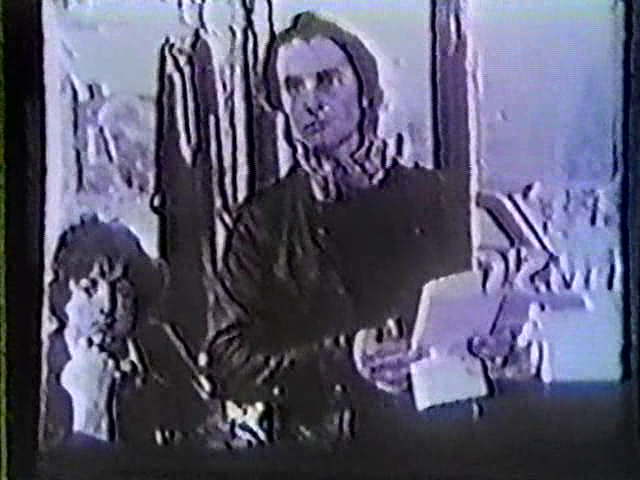About 50 minutes into Out 1: Spectre (1974), Jacques Rivette's 250-minute cut of his 700+ minute behemoth Noli Me Tangere (1971), I took a break. I didn't have to take a call or a nap, nor did I have any bodily needs to fulfill. I simply felt the urge to get away from it. Even though I had seen all Spectre was going to show me (and more) in the longer cut, it was kind of freaking me out. I'd heard it was a more difficult piece of work than Noli Me Tangere, which I doubted (it seemed logistically a much easier work to consume), but it's true. Long swaths of Spectre take pieces of scenes that originally played out in languid real-time and intercut them with other scenes in highly disorienting fashion, often dropping into this already complex-to-the-point-of-near-chaos editorial schema black & white photographs of scenes that have either occurred, are yet to occur, or will never occur in this cut, accompanied by an ominous electronic hum. The search for the identity and purpose of the mysterious Thirteen is now the only thread we have to keep our bearings in an initially overpowering blitz of incident, much of it simultaneously trivial and pulsing with ominous significance.
Several posts ago, I wrote of the longer cut that "[T]he characters' attempts to find a way Out, to puncture through the veil of banal reality Into a magical world of conspiracy and all-connectedness, only leave them trapped further Inside their little solipsistic bubbles. While that occurs In the fiction, the film that contains the fiction is another matter. The dreams of the characters fizzle and implode, while the dream In which they're figured expands ever Outward." In Spectre, the relation of the film to the mental state of the characters is more 1:1. The difference between Noli Me Tangere and Spectre is that of a film about paranoia and a paranoid film. Spectre doesn't expand outward, it contracts inward, a discombobulating sensation that's hard to deal with for an hour, let alone four. Rivette seems to have realized this, as the pace of the film slackens considerably after the first hour and change. Many sequences in the film's second half play out at close to their original length. But since the montage conjures such a sinister tone, what often plays out as a kind of intellectualized stoner comedy in the longer cut is here suffused with dread.
2 other ways of thinking about the two cuts:
- Noli Me Tangere is a good trip; Spectre is a bad trip.
- Both are improvisatory games played over the void (or, alternately, the real, i.e. the stuff of life that we impose meaning/narrative onto), but Noli Me Tangere smiles at the void/real and Spectre gives itself vertigo contemplating it.
Despite being a considerably freakier film, Spectre omits the two strangest, most jarring scenes in Noli Me Tangere: a scene where a dazed Colin (Jean-Pierre Leaud) has a conversation with Sarah (Bernadette Lafont) in which seemingly crucial lines of dialogue are looped backwards (in effect rendering the scene incomprehensible except as a representation of Colin's escalating madness); and a scene where Sarah stares with unsettling intensity at Pauline/Emilie (Bulle Ogier) and asks her repetitive questions, which goes on at such length that they--or the film itself--seem to have become stuck in a temporal loop.* It's a credit to Rivette's editorial genius that one doesn't feel the absence.
I'm tempted here to make some kind of qualitative pronouncement about which cut is "better." I found Spectre's pleasures harder to access than those of Noli Me Tangere, whose tone and rhythm is more inviting, and which I'll probably return to more often, despite its being thrice Spectre's length. But I can't hold one over the other. Out 1, in either form, confounds the kind of language we typically use to speak about movies. It's notsomuch that value judgments don't enter into it (since we can of course go through either version and cherry-pick which scenes don't really hold together and which scenes are, like, the best thing ever), but that they couldn't be more beside the point of the thing.
*The fate of Papageorge (Myles Paige) in Andrew Bujalski's Computer Chess (2013) bears more than a passing resemblance to this scene. In addition to being the best American film of the year thus far, Chess is quite a Rivettian one, despite its comparatively attenuated length and very American idiom. But it's not the most Rivettian thing out right now, judging from what I've read about Matías Piñeiro's even-shorter Viola (2013). Do I sense a mini-Rivettaisance coming on?




No comments:
Post a Comment